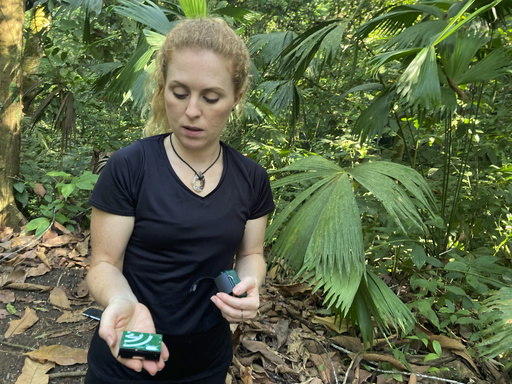PUERTO JIMÉNEZ, Costa Rica — The endangered Geoffrey’s spider monkeys, known for their high, elusive movements in the rainforest canopy, pose a significant challenge for researchers aiming to track them effectively.
In response, biologist Jenna Lawson has strategically placed 350 audio monitors across the vibrant landscapes of Costa Rica’s Osa Peninsula to monitor their activities.
The audio devices captured the sounds of the surrounding environment continuously over the course of a week, generating an overwhelming amount of data—so substantial that it could occupy Lawson for many years in analysis.
Rather than sifting through the audio recordings manually, she employed artificial intelligence algorithms specifically designed to identify spider monkey vocalizations and map their movements. This represents one of the largest wildlife acoustic studies globally, initiated in 2021, yielding concerning insights into the ecological condition of a vital wildlife haven.
As about 28% of plant and animal species are currently facing extinction, the call for advanced AI-driven wildlife monitoring is more critical than ever, as revealed in a research paper published in the journal Science this summer.
Scholars from Dutch and Danish institutions highlighted that machine-learning techniques can manage extensive data volumes and identify sound patterns efficiently, facilitating quicker and more economical ecological studies that support biodiversity conservation. However, significant technical obstacles remain to be addressed.
Recently, Microsoft’s AI for Good Lab expressed its intention to tackle some of these technical hurdles through the development of innovative hardware and computing capabilities aimed at monitoring the planet’s most remote natural habitats.
“These isolated areas are crucial from a biodiversity standpoint,” remarked Microsoft’s chief data scientist Juan Lavista Ferres during a video call from Colombia, where a research team is preparing for an initial field test of this new technology.
The devices, named Sparrow, which stands for Solar-Powered Acoustic and Remote Recording Observation Watch, are designed to operate sustainably using solar power and energy-efficient AI chips, functioning for several years autonomously while relaying data online using low-Earth orbit satellites.
Pablo Arbelaez, who heads an AI-focused research center at the University of the Andes, stated that the first testing of Sparrow will take place in a protected jungle area along the Magdalena River in Colombia. Ultimately, the researchers aim to gather data regarding how deforestation and restoration efforts impact the behaviors of endangered species like jaguars, blue-beaked paujil birds, and spider monkeys.
A related project closer to Microsoft’s headquarters will oversee forest ecosystems in the Cascade Mountains of Washington state. Lavista Ferres envisions having devices deployed across all continents by late 2025, covering regions from the secluded Amazon rainforest to the gorilla habitats in the Democratic Republic of the Congo. The data collected will be made openly accessible to a broad range of researchers in real time, ensuring that vital location details are safeguarded against misuse by poachers.
Lawson’s motivation for the extensive bio-acoustic study stemmed from concerns over the loss of spider monkey habitats in Costa Rica. In collaboration with landowners, she positioned recording devices on properties adjacent to Corcovado National Park, a cornerstone of Costa Rica’s longstanding dedication to biodiversity preservation and wildlife tourism.



